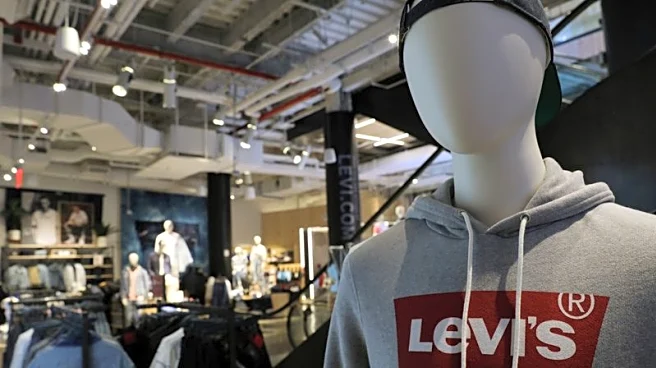By Siddharth Cavale
NEW YORK (Reuters) -A handful of apparel retailers including Levi's and Aritzia are teasing more full-priced products, testing how much wealthier shoppers are willing to pay despite
the sobering effect of tariffs.
They have not been disappointed so far.
Levi Strauss, for instance, raised prices on some products in July but saw no slowdown in demand, the denim maker's chief financial officer, Harmit Singh, said at the Goldman Sachs Global Retailing Conference in New York on Wednesday.
"We are making a full-court press in selling higher full-price than we have done in the past," he said. "The Levi's consumer largely earns $100,000 and over. And that consumer we are seeing is generally resilient."
Aritzia's finance chief echoed that, saying there had been minimal impact on how much the U.S. customer was ordering after the high-end clothing maker raised some prices earlier this year.
The company, whose clothes are worn by celebrities including Beyonce, Bella Hadid and Pamela Anderson, does not plan to chase promotions and discounts this holiday season, offering instead just one week of sales during Black Friday and then going full price after Cyber Monday for the rest of the season.
"With every passing week we become more confident that consumer resilience is going to hold," the Canadian retailer's CFO Todd Ingledew said at the conference on Wednesday.
While lower-income households are hunting for bargains as U.S. President Donald Trump's trade war has forced companies to raise prices, wealthier consumers are buying steadily, largely unaffected by the cooling labor market.
Stock market gains and low credit card debt have bolstered the finances of the affluent. According to Moody's Analytics, the richest 10% of Americans - those earning at least $250,000 a year - now account for half of all consumer spending.
LOYAL SHOPPERS
Ralph Lauren, Under Armour and Abercrombie & Fitch are also leaning into a more full-price strategy, they said in recent earnings disclosures.
"We've been shifting our business towards a more elevated full-price consumer base, and this has served us well as our core consumer around the world remains resilient," Ralph Lauren CEO Patrice Louvet said in early August.
Under Armour's CEO Kevin Plank said in August the company was considering bumping up prices for the "embedded consumer who we do have pricing power with," referring to loyal customers. "We're seeing success testing new key items at full price, including our $45 Self-form hat and our heat gear collection are both strong examples."
Due to better consumer-tracking technology now, retailers are able to pivot quickly and offer targeted promotions if stocks don't sell, helping retailers better maintain profit margins, said Kate McShane, managing director at Goldman Sachs.
"In the old school way of doing things, you would get a circular saying everything is 25% off ... Now if they're selling North Face fleece jackets and it's 60 degrees in New York, they can offer it on sale only for a couple of days in New York," and keep prices the same elsewhere, she said.
Many companies have absorbed a lot of the tariff costs already, analysts said, and will try to discount as little as possible through the holiday shopping season, compared to years past when they discounted any extra items held in inventory.
"If you look at Summerween and back-to-school this year, the strategy there was to put the seasonal items on the shelves at full price to start," said Alison Furman, a PwC retail consultant, referring to Halloween-in-summer shopping.
"You're kind of testing the waters around what a consumer will pay full price for. And then when it doesn't move, you very quickly go into your promotion strategy."
(Reporting by Siddharth Cavale; Additional reporting by Aishwarya Venugopal in Bengaluru; Editing by Sayantani Ghosh and Sonali Paul)









